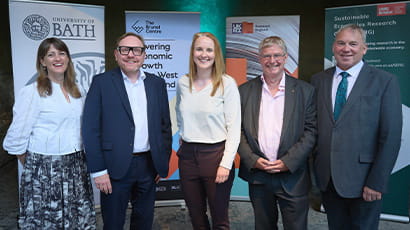Prototype scanner reveals inner workings of renowned 18th-century painter

The artistic methods and style of 18th-century Italian painter Giovanni Antonio Canal, commonly known as Canaletto, have been examined and uncovered by researchers at the Centre for Fine Print Research at UWE Bristol using a prototype scanner capable of capturing minute details, textures and brushstrokes that are invisible to the human eye.
Researchers were given the opportunity to trial their scanner on Canaletto’s ‘The Grand Canal, Ascension Day’ oil painting which is currently on display at the Holburne Museum in Bath as part of their ‘Canaletto: Painting Venice’ exhibition. It is the first time in more than 70 years that the paintings have left their home at Woburn Abbey – one of the world’s most important private art collections – giving members of the public the opportunity to see some of Canaletto’s best works up close.
3D scanners are often used by conservators and curators to document and evaluate the condition of paintings and understand artists’ techniques. Information gathered by the scanner can be used to visualise surface texture in ways not previously possible. While most scanners are very costly and capable of examining only small objects or paintings in detail, researchers from UWE Bristol created a cost-effective prototype scanner capable of capturing much larger works, including the Canaletto painting which measures 190cm by 120cm.
The painting was scanned over three days and more than 5,000 up-close images of the painting were captured to create the final scanned images which users can view and interact with online. The final high-resolution images provide a fascinating insight into Canaletto’s working method, particularly his process of incising and outlining the architectural elements of the painting. Meanwhile, shaded images rendered from the surface structure information clearly show the incision lines that were produced while the paint was still wet. These allowed the artist to emphasise architectural details.
Research Fellow, Dr Xavier Aure said: ‘‘It was a privilege to examine and capture one of Canaletto’s masterpieces. The images we have generated using the scanner reveal so much about his working style and process; we can extract information about the surface, see how the artist applied paint and learn more about the way he constructed his work. We also hope to launch an online viewing platform in the near future so that these high-resolution scans can be seen by the public, giving people the chance to engage with Canaletto’s painting remotely which is so important during the pandemic when travel is restricted.’’
Best known for his city view paintings of Venice, Rome and London, Canaletto was a distinguished landscape painter whose works have been known to fetch $20 million at auction.
Related news

12 December 2025
UWE Bristol’s environmentally conscious and student-focused accommodation wins three awards
Purdown View, the world's largest certified Passivhaus student accommodation development, has been recognised at Property Week Student Accommodation Awards.

25 November 2025
Health-tech start up MyCelsius launches breakthrough cooling tech for hot flushes developed at UWE Bristol’s Launch Space
A pioneering Bristol-based health-tech company developing cutting-edge cooling technology for hot flushes has credited UWE Bristol’s Launch Space incubator with playing a key role in accelerating its product development.

14 November 2025
Lecturer wins prestigious Times Higher Education award for innovation in teaching
A senior paramedic science lecturer at UWE Bristol has been named the most innovative teacher of the year in the Times Higher Education Awards 2025.

13 November 2025
Alliance Medical and UWE Bristol launch UK’s first PET-CT postgraduate certificate
In a move set to transform imaging education, Alliance Medical (AML) and UWE Bristol have joined forces to co-design and develop the UK’s first PET-CT Postgraduate Certificate (PG Cert).

13 November 2025
New AI research to revolutionise animal welfare
A UWE Bristol research project will combine behavioural science and AI to create technology that understands not only what animals do, but how they feel.

29 October 2025
UWE Bristol academic unveils breakthrough in energy-efficient AI at NATO science forum
Dr Jonathan Lancelot has developed a new form of AI that could transform how intelligent machines operate in space, defence, and remote environments.

07 October 2025
Academic playing role in project to find hidden graves in Mexico using drone technology
A UWE Bristol lecturer is playing a part in a project using drone technology to locate concealed graves in Mexico.

01 October 2025
New funding for researchers to develop trustworthy clinical AI for assessing brain activity
Researchers have received funding from UK Research and Innovation to help bring their innovative brain-monitoring AI technology closer to real-world use.

11 September 2025
New study to investigate augmented reality as an intervention for emotionally based school avoidance
A UWE Bristol researcher will support a new study exploring whether an augmented reality board game can help young people with emotionally based school avoidance (EBSA).

22 August 2025
A decade of Future Space: How UWE Bristol’s enterprise zone is powering innovation and economic growth
Tracey John, Director of Research and External Engagement, reflects on the impact of Future Space and its role as a launchpad for cutting-edge companies shaping the future of how we live and work.

11 July 2025
Wound dressings developed with support from UWE Bristol to be launched by global firm
Technology that a team of UWE Bristol scientists helped develop to aid the healing of chronic wounds will be used in new ‘smart dressings’ being launched by global medical company.

03 July 2025
Research lab The Brunel Centre opens to power sustainable and inclusive growth for the West of England
A new data and research centre designed to support sustainable and inclusive growth and industrial strategy in the region, has officially launched.






